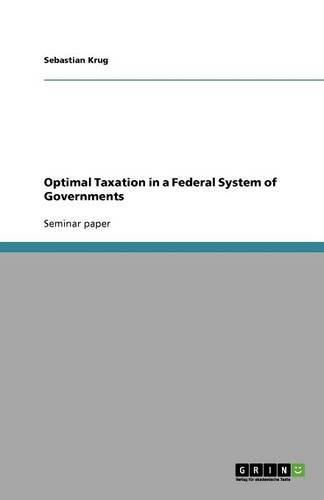Readings Newsletter
Become a Readings Member to make your shopping experience even easier.
Sign in or sign up for free!
You’re not far away from qualifying for FREE standard shipping within Australia
You’ve qualified for FREE standard shipping within Australia
The cart is loading…






Seminar paper from the year 2011 in the subject Economics - Finance, Christian-Albrechts-University of Kiel (Department of Economics), course: Seminar in Public Economics and Social Policy: Federalism and (De)Centralization, language: English, abstract: An implemented tax system causes distortions which leads to a minor overall welfare level compared to a system without taxes. This deviation in social welfare is often denoted by excess burden or dead weight loss (DWL) of taxation. So the traditional optimal taxation approach comprises the implementation of a tax system which minimizes the excess burden and hence the distortions caused by the levied taxes. Therefore, the policy maker has to anticipate possible behavioral adjustments of the market participants when choosing its optimal tax policy. Assuming the policy maker will do so all effects (i.e. distortions) caused by the tax system will be internalized which means that no fiscal externalities would arise from implementing the (optimal) tax system. However, the traditional optimal taxation approach abstracts from any intergovernmental relations as the existence of only one government and accordingly only one level with fiscal jurisdiction is assumed. The question here is whether and to what extent federal structures (i.e. multileveled government structures) affect the optimal tax policy decision. The first attempt to take into account the characteristics of a federal system related to optimal tax policy goes back to Gordon (1983) who applied the methodology of the traditional optimal taxation approach to fiscal federalism. Therein each unit of government (i.e. the federal and usually several state governments) decides independently how much of public goods to provide and in particular which tax policy to use in funding the provided public goods. Hence, we now consider a decentralized form of decision-making in which each unit of government chooses the optimal tax policy in the best interest of its own residents.
$9.00 standard shipping within Australia
FREE standard shipping within Australia for orders over $100.00
Express & International shipping calculated at checkout
Seminar paper from the year 2011 in the subject Economics - Finance, Christian-Albrechts-University of Kiel (Department of Economics), course: Seminar in Public Economics and Social Policy: Federalism and (De)Centralization, language: English, abstract: An implemented tax system causes distortions which leads to a minor overall welfare level compared to a system without taxes. This deviation in social welfare is often denoted by excess burden or dead weight loss (DWL) of taxation. So the traditional optimal taxation approach comprises the implementation of a tax system which minimizes the excess burden and hence the distortions caused by the levied taxes. Therefore, the policy maker has to anticipate possible behavioral adjustments of the market participants when choosing its optimal tax policy. Assuming the policy maker will do so all effects (i.e. distortions) caused by the tax system will be internalized which means that no fiscal externalities would arise from implementing the (optimal) tax system. However, the traditional optimal taxation approach abstracts from any intergovernmental relations as the existence of only one government and accordingly only one level with fiscal jurisdiction is assumed. The question here is whether and to what extent federal structures (i.e. multileveled government structures) affect the optimal tax policy decision. The first attempt to take into account the characteristics of a federal system related to optimal tax policy goes back to Gordon (1983) who applied the methodology of the traditional optimal taxation approach to fiscal federalism. Therein each unit of government (i.e. the federal and usually several state governments) decides independently how much of public goods to provide and in particular which tax policy to use in funding the provided public goods. Hence, we now consider a decentralized form of decision-making in which each unit of government chooses the optimal tax policy in the best interest of its own residents.